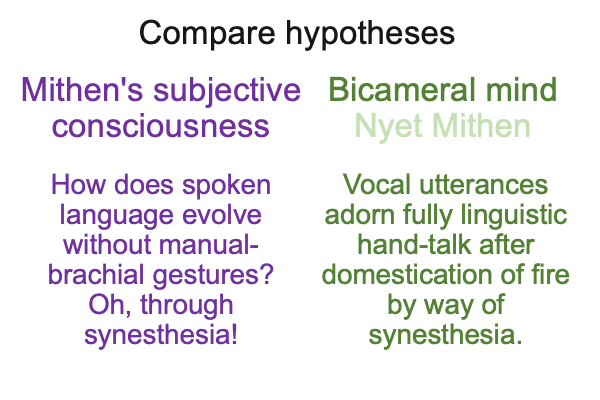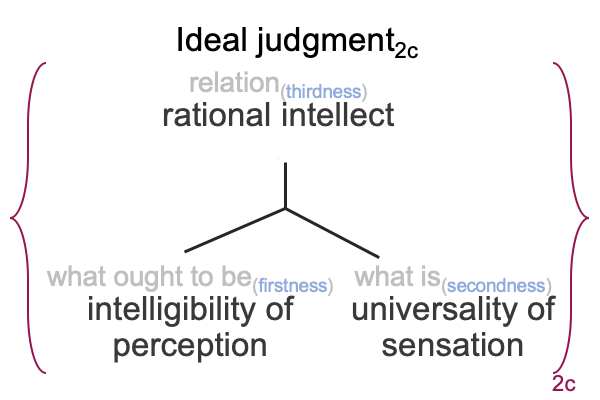0273 With the distinction between subjective consciousness and bicameral mentation ready at hand, I compare the two states that are on display in Steven Mithen’s recent book, The Language Puzzle.

0274 The question on the left comes from a judgment (that rules out gestural origins for language). This judgment brings the intelligibility of Mithen’s perceptions concerning various fields of modern scientific inquiry into relation with the universality of an impression, a hunch, that cross-modal sensory experiences have a role to play in fashioning spoken words. The visual impression of the thing itself crosses modes to the sound of a particular vocal utterance.
0275 The answer on the right manifests Mithen’s commitment to truth, rather than his will to bring together the various sciences studying the nature of language in our postmodern era. Mithen’s commitment brings a intimation that, after the domestication of fire and after the voice comes under voluntary neural control through selection for singing,hominins (such as late Homo heidelbergensis) add vocal utterances to fully linguistic manual-brachial word-gestures as a way to better decode hand-talk under “hearthy” circumstances.
Well, how would hominins do that?
Oh yeah, through deliberate synaesthesia!
0276 The astute reader will notice that the above declarations on the left and the right do not take the shape of a virtual nested form in the realm of actuality. They conform to a similar, yet distinct, relation.
Here is a picture of judgment2c, as idealized by the medieval scholastics.

0277 Of course, medieval scholastics never formulate judgment as a diagram. For one thing, parchment is very expensive. Written Latin words, such as rationes (for rational intellect, or “ratio”), species expressa intelligibilis (for the intelligibility of perception) and species impressa intelligibilis (for the universality of sensation) take much less space than a drawing.
What does that imply?
Well, the Latin term for “perception” must be species expressa (literally “a kind of expression”). Similarly, “sensation” must be species impressa (“a kind of impression).
0278 Using Latin terms, the above diagram says, “Rationes (relation, thirdness) brings species expressa intelligibilis(what ought to be, firstness) into relation with species impressa intelligibilis (what is, secondness).
0279 Note the categorical assignments.
The category of thirdness is the realm of triadic relations, such as judgments, category-based nested forms, mediations, signs and so forth. So, the element of judgment that is assigned to the category of thirdness will “unfold” into the normal context3 of a category-based nested form.
Similarly, the category of secondness is the realm of actuality. The element that is assigned to secondness is the universality of sensations. After all, species impressa intelligibilis goes with what is, and what is tends to be more actual than what ought to be. What is (secondness) will enter the slot for actuality2.
0280 Finally, the category of firstness is the realm of possibility. The element that is assigned to firstness is the intelligibility of perception. That is because… well… consider the idea of a nyet hypothesis. A nyet hypothesis offers a better understanding of the question at hand than a well-constructed modern hypothesis. Indeed, it offers a better formulation of the question at hand!
So, in this instance, species expressa intelligibilis, as what ought to be, must be assigned to the category of firstness. The intelligibility of perception will unfold into the slot of possibility1.
0281 Now, I ask, “What happens when I unfold this judgment according to its categories?”
Here is the diagram.

0282 Commitment2c, the unfolding of judgment2c, labels the above category-based nested form. The normal context of a rational intellect3(2c) brings the actuality of the universality of sensation2(2c) into relation with the potential ‘intelligibility of perception’1(2c).
0283 Technically, this statement applies to subjective consciousness, whose origin (according to Julian Jaynes) is to be located in the breakdown of the bicameral mind.
0284 Does that mean that I could substitute in the terms for the bicameral mentality?
Well, yes and no.
0285 Yes, but the problem is that the inquirer starts to lose touch with subjective consciousness, because the labels apply to an unfamiliar noumenon. What does it mean for commitment2c to virtually bring a phantasm2b into relation with decoding2a. What the hell is being decoded?
Oh, decoding2a must be part of that thing that Jaynes calls an “auditory hallucination”.
0286 No, the Latin terms suffice. The Latin terms convey a very strange connotation. The species expressa intelligibilis1(2c), the intelligibility of perception (as well as phantasm), is a possibility that drives natural selection in our lineage. Our lineage adapts to the potential of species expressa intelligibilis1(2c).
This potential belongs to the human niche.
